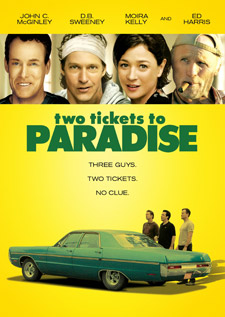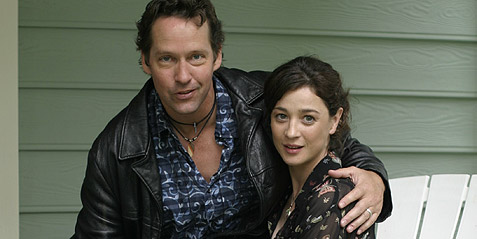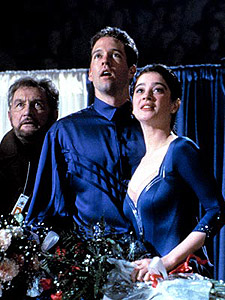
Interview Date: 07/31/2010
Run Date: 08/03/2010
Interviews Home / Movies Home / Bullz-Eye Home
The girls all want to be with him, and the guys all want to have a beer with him. For a generation, D.B. Sweeney was George Clooney before there was George Clooney, and while it may have been 18 years since his big close-up in the ice skating rom-com “The Cutting Edge,” the mere mention of his name still makes the hearts of our female friends go a-flutter. Bullz-Eye caught up with Sweeney as he was promoting the darkly comical road movie “Two Tickets to Paradise,” his directorial debut – which he made four years ago, but is getting re-released on DVD with a big marketing push from Paramount – and chatted about the perils of working with untamed reptiles on a small budget, MGM’s ‘reissue, repackage, repackage’ tendencies with his biggest hit, and how Eddie Money’s people said they’d be happy to let Sweeney use his namesake song in the movie…if Sweeney changed the title of the movie. Wait, you don’t want the movie to have the same title as your song? We’ll never understand musicians.
Bullz-Eye: You should know that my female Facebook friends swooned when I told them I was talking to you. The ladies, they kinda like you.
D.B. Sweeney: Aw, man, that’s so nice. Thanks!
BE: When did you first start banging around the idea behind “Two Tickets to Paradise”?
DBS: It was the winter of 2002, and…I don’t want you to get the wrong idea, because this movie’s completely a comedy. I don’t know if you had a chance to see it yet…
BE: I did.
DBS: …but it has some somber roots. I had friends who were New York City firefighters, and in the winter of 2002 they were still going to funerals almost every day – or several a week, anyway – and maybe spending a little too much time at the bar after the funeral. So I’m sitting with these two guys one night, and I said, “You gotta take a night off. Why don’t you go bowling, or go to a movie?” And they had the biggest laugh they’d had since September [11]. They fell off their chairs and said, “Movies? Nobody makes movies for us anymore.” And I thought, “You know what? I’m gonna try.” And all these years later…I used to make fun of people who said, “I spent eight years making my movie.” I thought, “Come on, you shoot it in three months, you edit it, you put it out there. Let’s go.” But independent movies are a little different.
BE: After seeing the extras, I learned that “Two Tickets to Paradise” was not the original title for this movie. (Editor’s Note: It was originally called “Dirt Nap.”) While I usually object when movies are renamed, I think you made the right choice here.
DBS: Yeah, the script was a little more morbid, a little darker. And as we were filming it, it got lighter, and I started trying to emphasize the entertaining elements as opposed to the moody and more thought-provoking parts of it. And the title didn’t match the movie. “Dirt Nap” sounded like a Paul Sorvino movie where he has a couple of big kids and he’s the mob boss. I thought it was really the wrong title.
BE: And I’m guessing the name change was too late to add the Eddie Money song of the same name to the soundtrack.
 DBS: We tried to [add it]. I had such good fortune with the music; I don’t want to complain, because we got Bruce Springsteen and Bob Dylan and Dire Straits and Stevie Ray Vaughan’s estate, they all saw the movie or knew enough about the movie to say, “This movie’s for us. We want to support it.” And they gave me great deals on all the music. So when I changed the name of the movie, I thought, “I gotta get that song,” because I love that song. I never got to Eddie Money personally the way I got to those other people, and Eddie Money’s people were not helpful, but they did make one offer where they said, “If you change the name of the movie, we’ll give you the song.” And I thought, I don’t want to go back to “Dirt Nap,” and I really liked the title, and no offense, but I already have Springsteen and Dylan and Dire Straits. If you guys don’t want to be in [the movie], I’m okay.
DBS: We tried to [add it]. I had such good fortune with the music; I don’t want to complain, because we got Bruce Springsteen and Bob Dylan and Dire Straits and Stevie Ray Vaughan’s estate, they all saw the movie or knew enough about the movie to say, “This movie’s for us. We want to support it.” And they gave me great deals on all the music. So when I changed the name of the movie, I thought, “I gotta get that song,” because I love that song. I never got to Eddie Money personally the way I got to those other people, and Eddie Money’s people were not helpful, but they did make one offer where they said, “If you change the name of the movie, we’ll give you the song.” And I thought, I don’t want to go back to “Dirt Nap,” and I really liked the title, and no offense, but I already have Springsteen and Dylan and Dire Straits. If you guys don’t want to be in [the movie], I’m okay.
BE: As soon as I heard the Springsteen song, I thought, “Oh, that couldn’t have been cheap.” Tell us about what you learned about that side of the business while putting this movie together.
DBS: Well, first of all, the music companies, they don’t want any part of movies, because it’s way more trouble than it’s worth unless it’s a seven-figure, you know, Jerry Bruckheimer buying a song for some summer event movie and money’s no object. Otherwise, I think the music companies have been so battered with a lot of these older songs, especially. They gave out these big advances to the artists, and they’re so underwater on these songs that the idea of letting someone have a song for…a song [laughs], they’re not really into it. So they basically tell you ‘no.’ So the only real way to get any of these songs is to get to the artists, and hopefully the artist still has some leverage with the record company. So ironically, the bigger the name, the more leverage they have, so even though it’s harder to get to a bigger name artist, once you get to them, they’re going to be able to ram it through the record company and force them to take the deal that the artist signs off on.
BE: Good to know.
DBS: Generally, the song is broken up into two pieces: the writing of the song, and the recording of the song. Usually, the artist controls the writing of the song, and then the recording of the song is owned by the record company. So in order to put the song in your movie, you have to have two separate agreements. So I found that if you get the artist [to sign a deal] first, the record company will still drag their feet, but they’ll come along.
BE: The line “I thought Styx was bulletproof” might be the funniest thing I’ve heard all year. [Note: In the movie, Sweeney, who plays a past-his-prime rock star wannabe, does the single worst version of “Blue Collar Man” in history.]
DBS: [Laughs] Thanks! Yeah, I love that line, too. We all know these guitar players who are really not good, and should not take the guitar out late at night at the party. You get out here in L.A., and sometimes you’re with some really good studio musicians, and people are hanging out at the end of a party, and one night this fella who’s really big, a former football player, took out his guitar and started playing a song. This is after people like…John McEnroe’s a pretty good guitar player, not on the level of the other guys, the studio musicians that were there, but some really good players were playing these songs. And this guy plays this song, and it was a U2 song. And this guitar player – he played with Guns ‘n Roses and all these other people – he’s really trying to be sincere and nice, especially because our friend is so big. So at the end of the song, he says, “Wow, that was great. Was that an original?” And it was actually a U2 song that we couldn’t recognize. So that was the genesis of that moment, that if you’re so bad that you can make a song unrecognizable, it’s time to put the guitar away.
BE: I was going to ask what happened to the Jason character at the end of the movie, but I found it in the deleted scenes. I was wondering why you decided to cut that, because that, as well as the other deleted scenes, was really good.
DBS: It was really hard to do that. That was the original ending of the movie, and I screened the movie at a few film festivals, and the movie did really well, but the universal comment that was coming back was, “We wanted more from the other two characters at the end of the movie,” John C. McGinley’s character and my character specifically. So I shot that scene where [my character] goes back and he picks up the girl and rides off into the sunset with her. Initially, my character rides off into the sunset by himself, and it was a little unsatisfying. So I just listened to the audience on that one. And also, the relationship between Jason and that girl, it didn’t fly off the screen the way the other stuff was, so I thought it was better to go with the stuff the audience is really responding with. It was the law of diminishing returns in that you can have a lot of good scenes, but when you stack them all together, by the end of the movie you may have a little bit of comedy fatigue, or story fatigue. I really feel like the limits of the human bladder and the human attention span are that, once you get past 90 minutes, you’re taking your life into your hands as a filmmaker.

BE: I noticed something else peculiar about this movie: nobody uses a cell phone.
DBS: That’s great, you’re the first guy to notice it! Or a computer. It’s very intentional. There’s a scene where John McGinley is balancing his checkbook at the kitchen table in the scene with his wife, he doesn’t have any money. I did a shot of the checkbook because a lot of the kids who go to movies now, they’re 20 years old, and if they have a checking account it’s on Quicken, or some Internet-based, electronic transaction basis with the bank. I really wanted to make a point that these guys, the last time things were going good for them, was pre-cell phones, pre-computers, pre-navigation systems. In 1987, when they were cool, that’s the world they lived in. And the car he’s driving is from 1973. They’re hanging on to this era that really doesn’t exist anymore. And they have to trash the guitar, they have to trash the car, they have to, to borrow a cliché, they have to put away childish things so that they can become men. It’s a late coming-of-age story in a way, so that was the intention of that.
BE: Talk about shooting the alligator scene. From the looks of the outtakes, those gators were pretty docile, but they’re still alligators.
DBS: The funny thing is that, since they’re reptiles, after about 15 minutes, when they figure out they can’t escape, they shut down and wait for an opening. They’re ready to snap at you at any second, but the problem that I found was what you observed: if you’re shooting at night, and they close their mouths, they look like rubber. They don’t even look like real alligators. That was a nine-foot alligator, and a seven-and-a-half-foot alligator, and they had just been trapped that day by an alligator trapper. There was no trainer in North Carolina, so I had to hire a trapper. This guy was a tobacco-chewing Steve Irwin. He had never been on a movie set before. And I never talked to him about how we were going to make it safe. But he starts banging this circus tent pole into the ground, and he’s stepping things off, and he says, “How close do you want the alligator?” I said, “They have to be close enough so that in one shot, you can see they’re right by my feet.” So he steps it off, and he puts this rope around the alligators’ back leg, and he ties the rope around a peg. And I said, “What else are you going to use, some kind of Plexiglas? What kind of movie magic do you have in mind?” He had never been on a movie set, so I don’t know what I was asking him for. He said, “That’s about it there, I think that’s tied up pretty good.” What do I do if they get out? He said, “Well, I’d run toward the little one.” And that’s when I thought, I’m going to lose my leg. Some people lose their house when they made an independent movie; I’m going to lose my leg. So I wanted to make sure they were rolling [when shooting that scene], in case that happened.
BE: When was the last time you had seen [“The Cutting Edge” co-star] Moira Kelly before making this movie?
 DBS: Moira and I did some additional DVD stuff for some re-release of “The Cutting Edge,” which… I don’t even know why we keep doing this. They never give us any of the money from this movie. It’s a license to print money. They’ve made two sequels to it, they re-release the DVD every 25 minutes…one of these times, they talked about doing a behind-the-scenes thing, so we said hello during that process. That might have been 10 years ago, I don’t know. But I love Moira. She’s great, and it was such a gift for her to agree to do this. And I didn’t know that she’s a bit of a reclusive-type figure. She was living in North Carolina at the time, which was a stroke of luck because we ended up filming there. And I just reached out to her and said, “Would you do this part?” Had I known I was going to get Moira Kelly, I would have beefed that part up so much more, and had so much more for her to do. But by the time I got her, that ship had already sailed, and we just had to go with it.
DBS: Moira and I did some additional DVD stuff for some re-release of “The Cutting Edge,” which… I don’t even know why we keep doing this. They never give us any of the money from this movie. It’s a license to print money. They’ve made two sequels to it, they re-release the DVD every 25 minutes…one of these times, they talked about doing a behind-the-scenes thing, so we said hello during that process. That might have been 10 years ago, I don’t know. But I love Moira. She’s great, and it was such a gift for her to agree to do this. And I didn’t know that she’s a bit of a reclusive-type figure. She was living in North Carolina at the time, which was a stroke of luck because we ended up filming there. And I just reached out to her and said, “Would you do this part?” Had I known I was going to get Moira Kelly, I would have beefed that part up so much more, and had so much more for her to do. But by the time I got her, that ship had already sailed, and we just had to go with it.
BE: From the looks of it, I’m guessing you had her on the set for a day, Ed Harris on the set for a day, M.C. Gainey on the set for a day. Is that fair?
DBS: Pretty much. The Ed Harris day was about 39 hours long, but it was a day, kind of. Moira, I had for a day and a half, and that was pretty much it. Except for me and McGinley and Paul Hitt – and then Janet Gretzky was there for about 10 days – everyone else was pretty much one or two days, max.
BE: Do you have any plans to direct again?
DBS: I’d love to direct again, but next time with somebody else’s money. When you’re the director, you’ve gotta fight for the movie, and when you’re the producer, you have to fight for the budget. When you’re both, you’re fighting with yourself. It’s a little too schizophrenic for me. There would be times when I want to do another take, but I know what the film costs, I know what it costs to run overtime, and I’m thinking, “Man, if I do two more takes, I go 20 minutes overtime. That costs me 1,850 bucks, if I put that in the bank right now for my three-year-old son, I could pay for his freshman year of college…okay, let’s do another take. He better be good at sports, get a scholarship.
BE: Speaking of sports, who won the College Championship Bowl in the movie, and how much did you hate having to call it the College Championship Bowl?
DBS: It was tough. I really wanted to call it the BCS Championship Game, but…the BCS didn’t have as much of an issue with it as FedEx, because at that time FedEx was the sponsor of it. Everything had to be cleared. Coors Light was great. They gave us money and trucks, which was astonishing, considering we have a scene of open containers driving around in the car. Office Max was great, and Hooter’s especially was our greatest sponsor, and now they’re helping us with some promotional stuff with the re-release of the DVD. But we couldn’t get FedEx to [sign on], because the tickets are very prominent in the story, and I thought it would be great to have actual tickets. They’re kinda glossy and distinctive, and I thought it would be great to have that. But they wouldn’t go for it, so we changed it.
But I’ll tell you, the funnier thing is that when we wrote the draft of the script that we sent out and tried to raise the money with in 2005, the BCS Game [in the script] was Texas against USC, and Texas won by a field goal. That’s actually what happened in the game a year later, but that year we went out to USC and said, “We need to get the rights to use your logo in the movie, put it on the tickets and everything.” And they said, “Well, who wins the game?” And we said Texas is going to win the game. And they said, “No, no way.” And we said, well, it’s a fictional game, and everybody knows it’s a movie, so I think you’ll be okay. They said, “If we win the game, you can use our logos.” And I said okay, however you like it. So I went to several other colleges. I went to Miami, I went to Alabama, I went to all these big power schools, and they all had the same attitude. They were like, “No, we don’t want to lose.” So Marshall was gracious enough…I guess they were just grateful to be invited to the Big Dance. They said, “Yeah, we can lose. Do we get blown out?”
BE: Your death scene in “24” was arguably the greatest death scene in the history of the show.
DBS: Aw, thanks, man! That’s awesome. I was so excited to do that show.
BE: I have to tell you that my wife and her best friend met you when you were at the Fox upfront in Chicago promoting “Strange Luck”…
DBS: Man, that’s going back a little.
BE: …and they are D.B. Sweeney fans for life because you actually asked them about their jobs, you were approachable…you were basically the only actor they’d met at an upfront who didn’t act like an actor.
DBS: Aw, man, that’s so nice. Thank you for saying that. I feel so blessed that I’ve had this great run for almost 25 years now, and there are definitely disappointments and things you wish had gone your way, but on the whole I’ve had such a great time and feel so fortunate to meet so many people. It’s great to hear that people notice that you’re normal. Tell your wife I said hi.
BE: I will. Thanks for talking with us. Best of luck with the movie, and whatever projects you have coming up.
DBS: You know what, if I could just mention, I’m on “The Event,” which premieres on NBC September 20. I’m not on the first episode, but the next five after that, and probably another five after that. It’s a really cool show.
BE: I’m looking forward to it. Thanks, man.
DBS: Thank you.
You can follow us on Twitter and Facebook for content updates. Also, sign up for our email list for weekly updates and check us out on Google+ as well.











